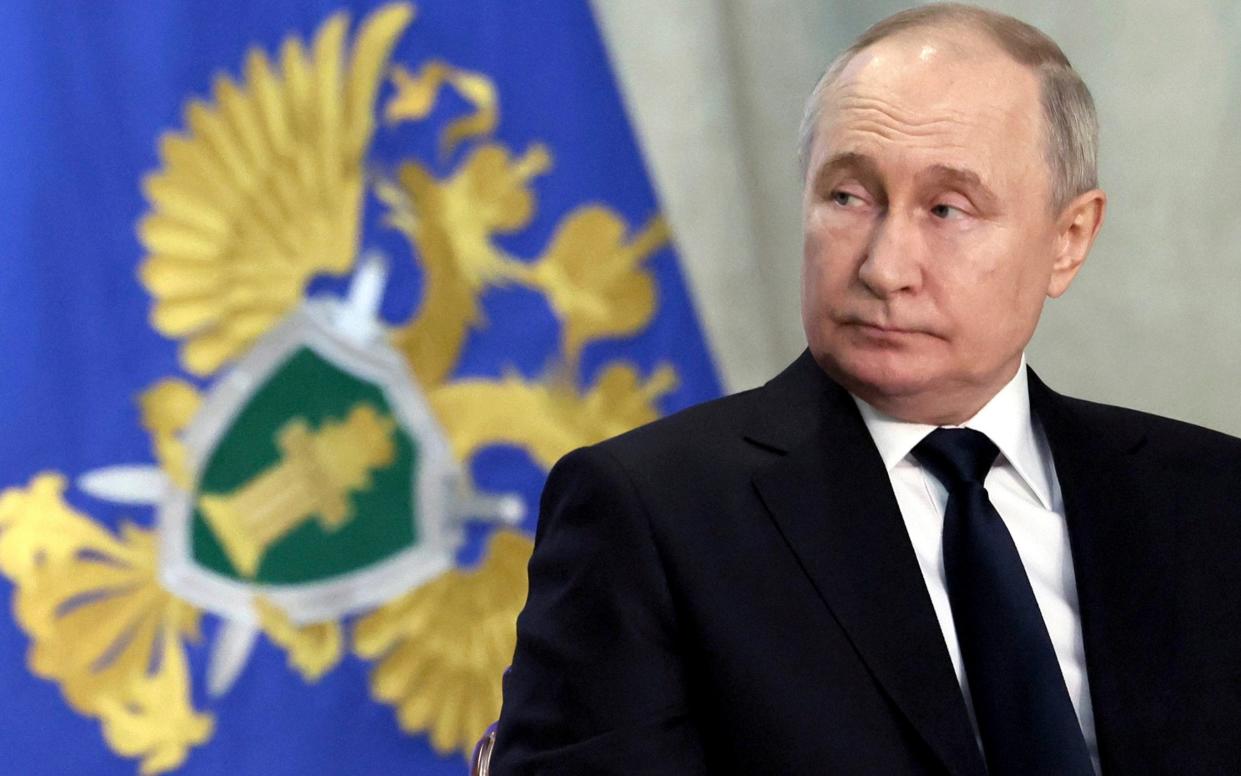Putin’s mafia state can’t protect its own people

- Oops!Something went wrong.Please try again later.
Last weekend’s terrorist attack at the Crocus City Hall concert venue was gory, disgusting, inhumane, savage… pick your negative adjective. A team of multiple shooters, clad in what looks like fatigues and stocked with automatic weapons, stormed the building as soon as the sold-out performance was about to get underway.
Amateur videos from the scene show sheer chaos, with defenseless concertgoers running for their lives as the terrorists methodically search out people to execute in cold blood. By the time the attack ended, more than 130 people had been killed and part of the building was razed to the ground.
Pay no heed to Russian President Vladimir Putin’s delusions about the violence in Moscow somehow being connected to the Ukrainian government. The Islamic State-Khorasan (ISIS-K) group was quick to claim responsibility for the shooting. The US stressed it had no reason to doubt the claim: it wouldn’t be a shock if ISIS-K prepared and executed an attack inside Russia.
As terrorism researchers have stated, the terrorist group based in Afghanistan has aspired to hit Russia for any number of perceived sins – the former Soviet Union’s occupation of Afghanistan in the 1980s, Russia’s two wars in Chechnya during the 1990s and early 2000s, and Vladimir Putin’s 2015 decision to bail out Syrian dictator Bashar al-Assad. Plenty of Russian bombs have killed plenty of ISIS militants in Syria, so it’s not like the organisation’s branch in Afghanistan wasn’t primed for revenge.
It’s also not at all surprising that the commentary in the days since the attack in Russia is a bit out of proportion.
Yes, the terrorist strike in Moscow was ISIS’s deadliest inside Russia by far. Yes, ISIS-K is no stranger to these kinds of indiscriminate strikes. In July 2023, an ISIS-K suicide bombing at a political rally in northwest Pakistan killed more than 40 people. This January, a pair of bombings killed more than 80 people in Iran at a commemoration ceremony for the slain Iranian general Qassem Soleimani. And yes, the group has also had success recruiting Tajiks into their ranks, many of which are employed in Russia as laborers.
Yet judging by some of the overhyped rhetoric, you might be mistaken for thinking that ISIS was getting ready to stake its claim to a second caliphate and that Americans were only a few days away from experiencing its own mass-casualty attack.
Indeed, it’s immediately after a terrorist attack when the threat of terrorism is played up most aggressively. Today is no exception; Republican senators and some commentators have suggested that President Biden’s decision to withdraw US troops from Afghanistan may have been the genesis for the kind of strike we saw in Moscow on Friday.
The more likely explanation for the disaster, of course, is that Putin and his security services screwed up. To blame a US withdrawal that took place two and a half years ago is to, in effect, give Putin cover for his own incompetence and misjudgment.
For one thing, just because the US military is no longer operating as a quasi-occupation force in Afghanistan doesn’t mean that Afghanistan has turned into a black-hole for the US intelligence community. While the ruling Taliban government may not like it, the US still flies drones over the country, likely has human assets on the ground and possesses the strike platforms to neutralise terrorist threats when required. If you don’t believe me, just ask the family of Ayman al-Zawahiri, the former Al-Qaeda leader who was killed in a US drone strike in the summer of 2022 in the heart of Kabul, the Afghan capital (the US withdrew its troops one year earlier).
The ability of the US to collect ISIS-related intelligence is still very much there. Before ISIS-K launched a double suicide bombing in Iran this January, Washington picked up actionable intelligence about a pending terrorist plot by the group and sent that information over to the Iranians as part of its “duty to warn” policy. The US did the same thing before ISIS-K hit the concert hall in Moscow last week.
On March 7, weeks earlier, the US Embassy in Moscow issued a public notice to Americans in Russia to avoid crowds, like concerts, as a precaution due to chatter about a possible terrorist attack in the area. The threat environment would look a whole lot scarier if the US didn’t have a clue about what was going on; fortunately, that isn’t the case.
The main storyline here isn’t the resurgence of ISIS, the Afghanistan withdrawal or even the threat of terrorism more broadly, which compared to other causes of death (like drownings, car accidents and natural disasters) is still a low probability scenario. The story is that Putin’s security services failed to prevent the slaughter in the heart of the Russian capital.
The causes of this failure aren’t known yet – that will be determined by the investigation the Russian government will inevitably carry out. But it wouldn’t be a stretch to assume that lax security at the concert venue itself, Putin’s unwillingness to take Washington’s threat warnings seriously and the Russian intelligence community’s misplaced priorities all have something to do with it.
The war in Ukraine, weeding out political dissidents at home, catching (and murdering) turncoats abroad and keeping the regime walled off from internal adversaries are all more important. Terrorism used to be a top agenda-item for the Kremlin, especially during Putin’s first term. But as Putin soon transitions into his fifth, it’s no longer as high on the list.
If you want to blame anybody for the Friday night massacre, blame the Russians. Nobody else.
